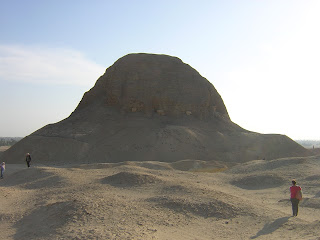
Historically, the Fayoum has been important because it is the lowest-lying and most fertile region of the country. Since the Middle Kingdom period, perhaps 4000 years ago, it has been a center for agriculture. Then more recently, about 300BC, irrigation systems, among the world’s most sophisticated, were developed to distribute the freshwater overflow from the Nile throughout the valley region. Throughout the rest of Egypt, there was only be one crop harvest per year; in the Fayoum they were able to manage three. This picture is an old wall that we drove over which is a regulator that was built to create the artificial reservoir that provided water to the region. The wall/road, which I’d say is at least 5 miles long, is probably 13th century, but is likely on the site of previous walls that were built to serve the same purpose, which this one continues to serve.

Other highlights of the trip were a couple of Middle Kingdom pyramids: Hawara

and Lahun.

 The experience is so much different than visiting the pyramids at Giza. Here, we were more or less alone with these enormous structures. A few notes about the conditions of the bricks. The outer layer of pyramids in this part of the country were built with limestone, which is a very good mortar used in construction. So, the outer layer of limestone has been taken over the years. (This explains the much better preservation of granite monuments.) I really loved these sites—it gives a good sense of the extent of monuments in ancient Egypt and I admit there is something romantic about their remoteness.
The experience is so much different than visiting the pyramids at Giza. Here, we were more or less alone with these enormous structures. A few notes about the conditions of the bricks. The outer layer of pyramids in this part of the country were built with limestone, which is a very good mortar used in construction. So, the outer layer of limestone has been taken over the years. (This explains the much better preservation of granite monuments.) I really loved these sites—it gives a good sense of the extent of monuments in ancient Egypt and I admit there is something romantic about their remoteness.We also visited some natural sites—including a lake and park with some small waterfalls and an array of birds (one of our guides was a naturalist).
 The original itinerary included a park with whale fossils, but there was a conflict with the bus company (who claimed this destination was not on the original itinerary and that the road was not in good enough condition) so this will have to wait until a future trip.
The original itinerary included a park with whale fossils, but there was a conflict with the bus company (who claimed this destination was not on the original itinerary and that the road was not in good enough condition) so this will have to wait until a future trip.We stayed overnight at the Panorama Hotel, which I liked though it seems like the rooms ranged in quality. On the range, we hit the jackpot. Our spot had a huge balcony overlooking Lake Fayoum.

When I say we were alone at most of these sites, I should point out that we had a military escort for the entire trip. About 10 years ago, after an attack on a tour bus in Luxor, the Egyptian government required military escort for any tour groups traveling outside of the main citieis or tourist sites. So once we enter the Fayoum governate, there is a truck of soldiers that we follow around. And all of the sites have guards positioned very dramatically. Though there has been some unrest in this region, I think that a lot of it is performative (as I guess many military installations are). I was grateful if for no other reason that they made for some nice dramatic photographs.



No comments:
Post a Comment